- Home
- Captain W E Johns
32 Biggles In The Orient Page 10
32 Biggles In The Orient Read online
Page 10
In that last wild onslaught he got one bomber for certain, in flames, and two probables.
He had a narrow escape. He flinched instinctively as a shower of bombs, flung off by a machine far above him, went sailing past at a curiously oblique angle. A Japanese pilot nearly fell on him, too, as he hurtled earthward with his parachute still packed. Then a sudden reek of glycol told Biggles that his radiator had been damaged, so he turned to the west, calling repeatedly on all pilots to rally.
The surviving bombers were now specks in the sky, most of them heading eastward. The fighters, too, were scattered; on those that were near he focused his eyes, in an endeavour to identify them. He saw Johnny's Beau-fighter, looking considerably the worse for wear, limping along on one engine. Other machines, Spitfires and Hurricanes, closed in. In a few minutes, strung out in a line across the sky, they were following.
Biggles' motor packed up just short of the airfield boundary, but he managed to scrape in.
Jumping out he watched the Beaufighter circle twice with its undercarriage retracted, and guessed the trouble. Johnny couldn't get his wheels down. At the end of the third circuit, with the ambulance chasing it round, the Beaufighter made a pancake landing, to finish cocked up on its nose. Biggles
95
smiled when he saw Johnny take a flying leap out of the cockpit and scuttle for a short distance before turning to look at the mess he had made. No one moves faster than an airman leaving an aircraft that is likely to burst into flames. Johnny got a lift on the ambulance, and the driver ran on to pick Biggles up.
"What a party—what a party! " yelled Johnny, who seemed wild with excitement. He appeared to be unaware that his nose was bleeding copiously, the result of his crash landing.
"I think we sort of discouraged them," said Biggles, grinning.
As they travelled slowly towards the tarmac Biggles checked the machines coming in.
He counted eleven. "Eleven out of sixteen—not bad," he remarked. Then he saw another machine, flying low, that he had overlooked. "Twelve," he corrected.
The station commander was waiting. "How did it go?" he asked tersely, anxiously.
"We gave them a pasting all right," answered Biggles. -Those that are left won't come this way, I'll warrant. A lot of them unloaded their bombs over the fields, so presumably they'll go back home."
"How many did you get?"
can't tell you that till we've checked up," replied Biggles. "We intercepted just this side of the lines, so confirmation ought to be easy, by counting the crashes. The troops on the ground must have had a grandstand view."
"No trouble with the secret weapon?"
"None at all," asserted Biggles. "Excuse me a minute, sir," he added quickly, "I'm anxious to find out who's missing. I know Scrimshaw has gone, for one. He either collided with, or deliberately rammed, a Mitsubishi. Something of the sort was pretty certain to happen; he was out for blood."
The pilots who had landed were now getting out of their machines—all except one. It turned out to be a ser-96
geant pilot of 910 Squadron with a bullet through his shoulder. An ambulance rushed him to hospital.
A quick check revealed that the missing pilots were Ginger, Henry Harcourt, Scrimshaw, and a pilot officer of 910 Squadron. One or two of those that returned had received minor wounds. All the machines showed signs of punishment. Bertie had had a remarkable escape. A cannon shell entering through the side of the cockpit had torn the sole off his boot without touching the foot, and then remained transfixed near the root of the control column without exploding.
"Did anybody see what happened to Ginger?" asked Biggles sharply. "I was with him just before the finish. He seemed all right then."
Nobody answered. Apparently nobody had seen Ginger go down.
"He may have baled out," said Biggles. "That goes for all of them—except Scrimshaw.
He went for a Burton in a big way."
"I'm not sure, but I fancy Henry got it in the first dive," put in Tex. "I didn't see him after that, but I noticed a machine going down, and it looked like his."
"Well, we shall have to wait." Biggles turned to the Group Captain. "Where's the Air Commodore?"
"He went off up the road and hasn't come back yet," answered the Group Captain. "Good show, you fellows. That's a load off my mind, I can tell you. I wonder why the Japs didn't use their secret weapon?"
"There was probably a reason," remarked Biggles softly. "This looks like the Air Commodore coming now. He's got someone with him. Who is it?"
"It's Henry," said Algy, as the car drew nearer.
The car did not stop, but raced on to the medical hut.
"That means Henry's hurt," observed Biggles. "Phew! Is it hot, and am I dry! Let's go and get a drink."
Before they reached the mess the Air Commodore joined them. He was smiling. "Great show, Biggleswortn —absolutely terrific," he complimented. "I never saw such 97
a scramble. At one moment I counted five Mitsubishis all falling at once."
"What about Henry?" asked Biggles.
"Nothing very serious, but I'm afraid he'll be off your strength for a bit.. One of the bullets that set his machine alight slashed his arm badly. He baled out, but hit a tree and damaged his leg. I fancy it's broken."
Biggles lit a cigarette. "Bad luck. Did you see anything of Ginger?"
"Oh, dear! Isn't he back? No, I didn't see him. That's not surprising, though. Machines were falling all over the sky. There is this about it though; if he baled out he'll be on our side of the lines."
Biggles nodded. "How many bombers do you reckon we got? We haven't checked up yet."
"I counted twenty-three hit the ground, but there must be a lot of others that won't get back. I noticed several making off, shedding bits and pieces, and they've a long way to go over that forest to their nearest airfield. Funny there was no sign of the secret weapon.
"
"Very odd," agreed Biggles, smiling faintly. "I'm going in for a drink—I'm as dry as an old boot. I want a word with you later, sir, but I shall have to see about combat reports first, while the thing is fresh in everyone's mind. You might send someone up to the lines to ask the troops if they saw where our machines fell. It's not much use looking for them from the air, with all that mess about, unless we have some definite information to go on.
You'd better arrange for a party to go out and collect the loose Japs, too; I saw a lot of them bale out."
"I'll do that," promised the Air Commodore. "See you presently."
Followed by the others Biggles walked on to the mess.
98
BIGGLES SUMS UP
IT was shortly after lunch when Air Commodore Raymond walked into the ante-room, to find the officers of 666 Squadron sitting about, or reclining, for it was the hottest time of the day and the heat was intense. Conversation still centred on the morning's big dog-fight, concerning which fresh details were being remembered and narrated, some humourous, some tragic.
"Any news of Ginger, sir?" asked Biggles, when the Air Commodore entered, and the others gathered round him.
"Not a word. By the way, have you heard how Mackail is getting on?"
"I rang up the hospital about half an hour ago," returned Biggles. "He's about the same—certainly no worse. I'm worried about Ginger at the moment."
"All units near the line are being questioned," stated the Air Commodore. "So many machines came down in a small area that it's hard to trace any particular one. How many bombers do you reckon you got, now you've made a check?"
"We make it twenty-six certain, ten probables, and at least thirty damaged."
The Air Commodore smiled. "Your fellows are too modest. There are thirty-one down on our side alone; several others were observed to be losing height as they made for home."
Biggles nodded. "Good. If we don't hear something about Ginger pretty soon we'll take what machines are serviceable and try to locate his aircraft. Has the M.O. made his report yet about Sergeant Gray?"
"Yes."
"What has he to say about him?"
"He's a bit puzzled, because the state of the body presents some unusual features; but he can't find anything to account for death, which he has ascribed to heart failure. The queer thing is, he says Gray had not been drinking."
99
could have told him that," murmured Biggles. "No sign of poison?"
"None. Nor were there any signs of a self-inflicted wound."
"There wouldn't be," said Biggles grimly.
"Why not?"
"Because Gray was murdered."
The Air Commodore stared. "Are you serious?" "This isn't exactly an occasion for mirth."
"You speak as though you are certain Gray was murdered."
"I'm convinced of it—now."
"But who on earth would kill Gray?"
"We've already discussed this, you remember? Any enemy agent would kill him. He was killed to prevent him from talking. I think I know who did it, but I'd rather not mention names until I have proof. I hope to have that very soon."
"You astound me," said the Air Commodore, looking shaken. "You haven't wasted your time."
"I've none to waste—life is too short. Besides which, India in the hot season isn't my idea of heaven. I want to get this job tied up so that I can go home."
"What about the secret weapon? From the way you behaved when you took off to intercept the Jap formation I gathered you had an idea about it."
"I've more than an idea," answered Biggles. "I know what it is. Only it isn't a weapon. I'
d call it a trick."
The Air Commodore looked thunderstruck. "Are you telling me that—you have—
actually got to the bottom of the thing?"
"Let us say almost. I'm far enough into it to see the bottom, anyway."
"But this is wonderful!" cried the Air Commodore. "I'll tell the Air Marshal that we've got the thing buttoned up."
"I didn't say that," disputed Biggles. "Let's put it like this. When I tackled the job it seemed to me that there were two angles to it. The first was to find the I00
thing, and learn how it did the mischief; the second was to put a stop to it. 'The first part has been done, but the second part is still very much in the air. We've got to be careful. If once the enemy realises that we've rumbled his game he'll slide away like a ghost on roller skates, maybe to start again somewhere else with a variation of the racket. We've got to bait the hook and strike our fish before he realises that we're after him. As it is, I'm a bit worried that he'll smell a rat."
"Why?"
"Because of what happened this morning. He'll know how many machines we put up, and how many came back. In other words, he'll know that for once his secret weapon went off at half-cock. True, he may think that was partly due to luck, or to the fact that it was a short show. That's what I'm hoping. But he may guess the truth. It is even possible that he saw me spike his guns, so to speak."
"You actually did that?"
"On this very airfield—right in front of your eyes." The Air Commodore looked at Biggles suspiciously. "Are you pulling my leg?"
"Have a heart, sir. What have I ever done to create the impression that I'm an irresponsible humorist?"
"Where is this weapon?"
"In my pocket. Would you like to see it?"
"I certainly would."
In dead silence Biggles put his hand in his pocket and produced a small bar of chocolate.
"That's it."
No one spoke. In an embarrassing silence the Air Commodore looked at the chocolate, then at Biggles, whose face was expressionless. "Are you out of your mind?" he asked coldly.
"You would be, if you browsed for a little while on this particular sample of confectionery."
Understanding began to dawn in the Air Commodore's eyes. A mutter of amazement came from the assembled officers.
The Air Commodore's eyes came to rest on Biggles' face. "Would you mind explaining?"
101
"I'm going to tell you the whole story, so far as I know it," returned Biggles. "I think it is my duty to do so, although the tale is not yet complete. In this detective line of business it was the practice of that prince of sleuths, Sherlock Holmes, to keep his clues and what-nots under his hat until he had the whole thing nicely rounded off, and then explode the solution with a rousing bang under the startled noses of his baffled associates. That technique, I regret to observe, has been maintained by the more humble members of his profession who have followed him. I say I regret it because it's stupid, it's selfish, and for all practical reasons, pointless. Had Holmes been knocked down by a cab, or otherwise accidentally been sent for a Burton, his secret, the result of his investigations, would have gone west with him, and the villains would have got away with it after all. In our case I'm not going to risk that happening. If the skunk who is operating on this airfield didn't mind killing Gray, he would, if he knew I was after him, be delighted to stick a knife in my ribs. In case that should happen you will be able to carry on, so here's the gen as far as I've got. It's a bit of a mouthful, but by the time I've finished you'll know exactly what's been happening and how things stand right now. Taffy, go over to that door and don't let anyone come near it. Tex—Ferocity, you take the windows and do the same thing. Sorry to be dramatic, but I'm not taking any chances of being overheard. The rest of you make yourselves comfortable. We've got the afternoon in front of us, and it's too hot to do anything, anyway. Moreover, I'm not quite ready for the next move. This is the story, so far." Biggles sank into an easy chair and lit a cigarette.
"The first thing that struck me about this weapon was that the Japs had invented it," he began. "The Japanese don't invent things—at least, not mechanical devices. They're good at copying other people's. They'll copy anything—they even copied their language from China. It would be a strange thing, you must admit, if they had produced a mechanical device, like a death ray, for in-102
stance, that has baffled Western scientists. For this reason I worked on the assumption that the hidden death was not a mechanical instrument. The next outstanding feature was the peculiar inconstancy of this alleged weapon. The machines on the China run that did get through, got through without any interference. Why? If this weapon was as efficient as it appeared to be on one occasion, why should it fail utterly on the next? The locality of the aircraft, the weather conditions, in fact, all conditions, were precisely the same.
Yet obviously something was different. What could it be? There was another factor, a curious one, but to me, significant. Only machines flying from west to east were lost.
Machines flying from Chungking to India got through. Again, why? A ray, or beam, or any other weapon, would surely work the same whichever way the aircraft was travelling. One was forced to the conclusion that whatever was happening was the result of something that started on the ground, not in the air. Clearly, the thing did not start at Chungking. There was no intermediate landing-ground, so it looked as if the trouble was at Jangpur. And whatever was happening there was happening, broadly speaking, to the aircraft.
"Now, an aircraft in flight consists of three parts—the airframe, the motor, and the pilot.
The failure of any of these must result in the failure of the whole. Therefore, should any one of these be affected the result would be the same—the machine would not get through. The question was, which was it? I resolved to tackle the three things separately, in turn. Frankly, I suspected that either the airframe, the engine, or the pilot, was being sabotaged —and in the end I was not far out. It was, I suppose, a natural assumption—
the first thing that would strike anybody. The problem was to find out what was being sabotaged, and how.
"I could think of no other way of testing this than by actual practice, so I decided to fly from Jangpur to Chungking. It was not what you'd call a fascinating experiment, because I like living as much as anybody, and I was staking my life against an opinion. I made the trip,
103
takin
g Bargent, the original pilot, with me. Nothing happened. Why didn't anything happen? The answer, according to my line of surmise, wasn't hard to find. Nothing happened because until I climbed into the aircraft no one, except Frayle, the C.O., Bargent, and myself, knew that particular machine was going to make the run. I took precautions to make sure nobody knew. In any case, the decision was taken so suddenly that there could have been no time for anyone to interfere with the machine. Another aircraft had been detailed, and I'm pretty certain that had I flown it, it would not have got through. Anyhow, there was lesson number one. I had proved that an unexpected pilot flying an unexpected aircraft could get through. This was in accord with my theory, and the implication was obvious. A saboteur was at work at Jangpur, a man who was in a position to know which machine was next on the schedule to make the run. It seemed safe to assume that what was happening at Jangpur was also happening here. I didn't risk a second trip at Jangpur. Oh, no. It might not have come off a second time." Biggles lit another cigarette.
"So for my second experiment I came here," he continued. "It confirmed my opinion.
Officially, we are a communication squadron, so nobody—I mean the saboteur—would expect our Mosquito to suddenly take off and head for Burma. Again I got away with it—for that very reason. Angus' arrival on the scene was not in my programme. He came up the river on his own account. But mark this! I understand there was some discussion in the mess as to who was going to escort Tug. This must have been overheard by the saboteur, who had time to sabotage Angus' machine before it took off. All this was supporting my theory."
"But Tug Carrington went back up the river," reminded the Air Commodore. "Why was his machine not tampered with?"
"For the very obvious reason that he did not take a machine from this station. He flew a seaplane, and had
104
to go some distance to get it. The saboteur, even if he knew about it, would have no time to get to it."
"Of course, I'd overlooked that," said the Air Commodore.
"Sergeant Gray, poor fellow, unwittingly provided the next link in the chain," resumed Biggles. "And a startling one it was. I told you that when I landed in the forest beside Moorven's crash I found nothing. That was not strictly true. I did find something, but at the time it suggested no sinister purpose. In fact, I threw it away and thought no more of it. It was a little square of pink paper, bearing the name of a British confectionery manufacturer. When I found just such a piece in A Flight shed, when Sergeant Gray was there, drunk, as we thought, I began to wonder. There was something else in that room that aroused my suspicions. It was a coffee-pot. On the occasion of my first visit I sent for coffee. Gray drank it all.

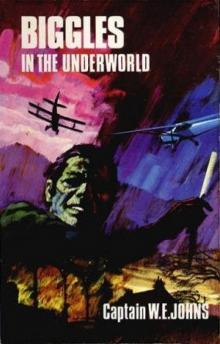 Biggles in the Underworld
Biggles in the Underworld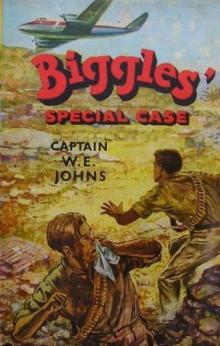 Biggles' Special Case
Biggles' Special Case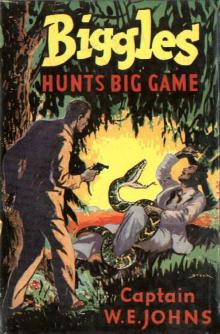 34 Biggles Hunts Big Game
34 Biggles Hunts Big Game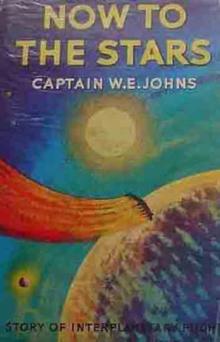 03 Now To The Stars
03 Now To The Stars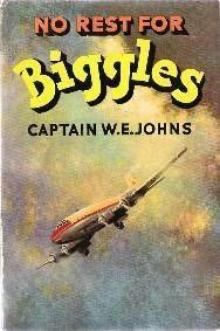 55 No Rest For Biggles
55 No Rest For Biggles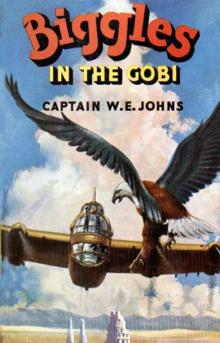 46 Biggles in the Gobi
46 Biggles in the Gobi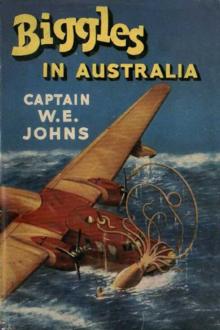 52 Biggles In Australia
52 Biggles In Australia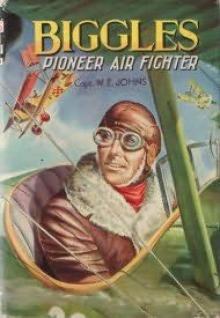 51 Biggles Pioneer Air Fighter
51 Biggles Pioneer Air Fighter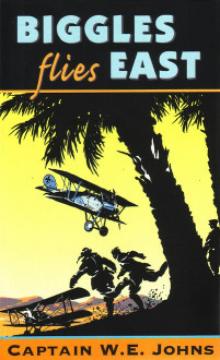 05 Biggles Flies East
05 Biggles Flies East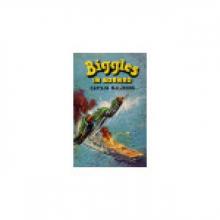 28 Biggles In Borneo
28 Biggles In Borneo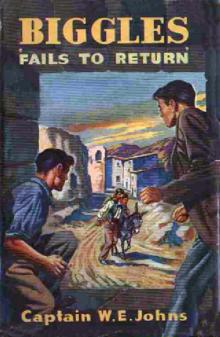 29 Biggles Fails to Return
29 Biggles Fails to Return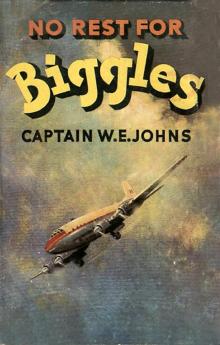 55 No Rest For Biggles (v2)
55 No Rest For Biggles (v2)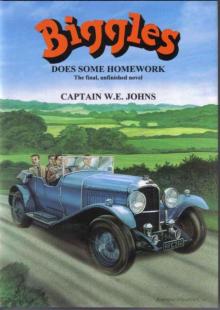 Biggles Does Some Homework
Biggles Does Some Homework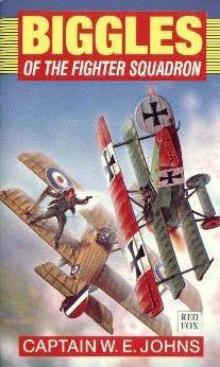 Biggles of the Camel Squadron
Biggles of the Camel Squadron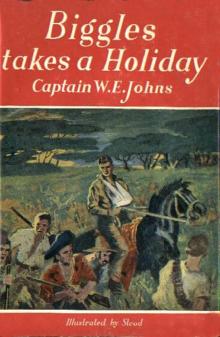 35 Biggles Takes A Holiday
35 Biggles Takes A Holiday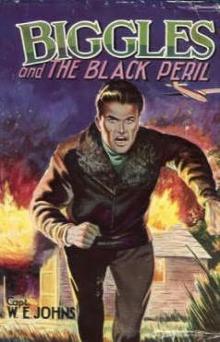 Biggles And The Black Peril (06)
Biggles And The Black Peril (06)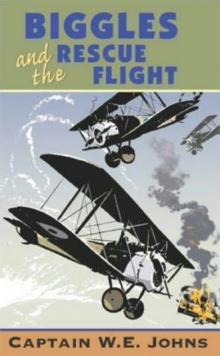 17 Biggles And The Rescue Flight
17 Biggles And The Rescue Flight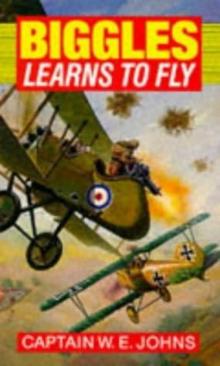 Biggles Learns To Fly
Biggles Learns To Fly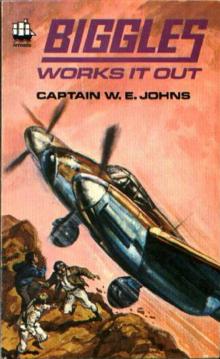 40 Biggles Works It Out
40 Biggles Works It Out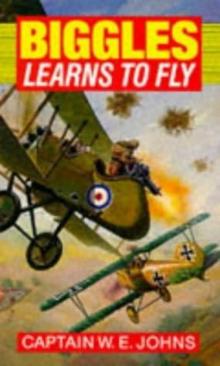 05 Biggles Learns To Fly
05 Biggles Learns To Fly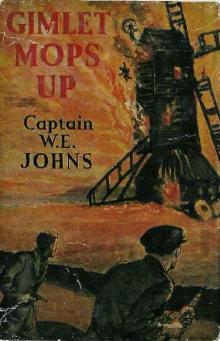 04 Gimlet Mops Up
04 Gimlet Mops Up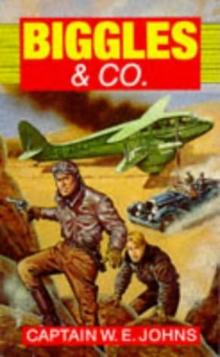 10 Biggles and Co
10 Biggles and Co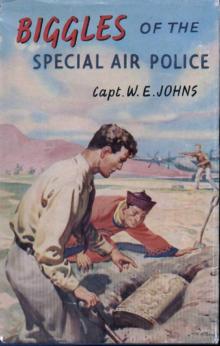 47 Biggles Of The Special Air Police
47 Biggles Of The Special Air Police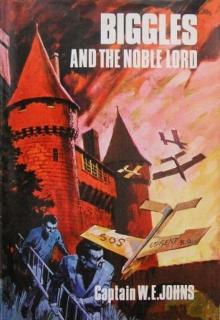 Biggles and the Noble Lord
Biggles and the Noble Lord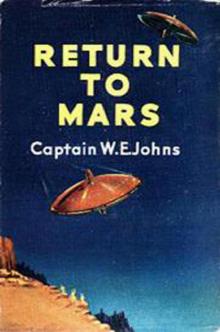 T2 Return To Mars
T2 Return To Mars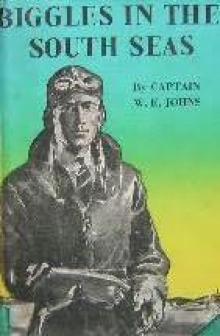 21 Biggles In the South Seas
21 Biggles In the South Seas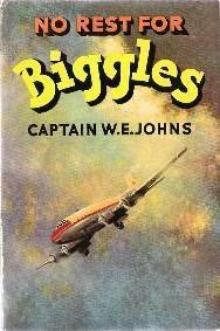 No Rest For Biggles
No Rest For Biggles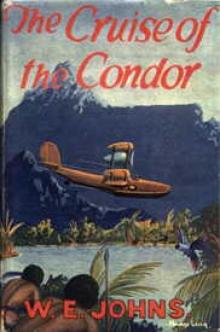 Biggles In The Cruise Of The Condor (02)
Biggles In The Cruise Of The Condor (02)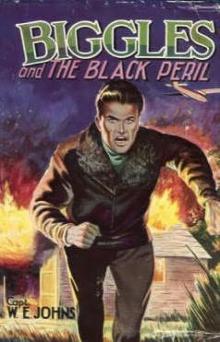 06 Biggles And The Black Peril
06 Biggles And The Black Peril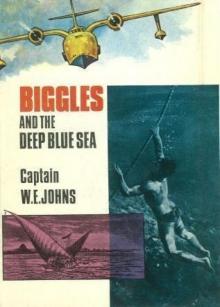 Biggles and the Deep Blue Sea
Biggles and the Deep Blue Sea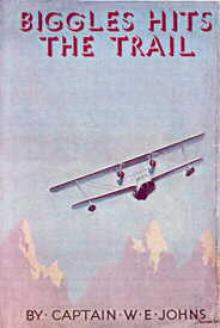 06 Biggles Hits The Trail
06 Biggles Hits The Trail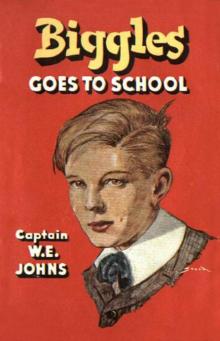 39 Biggles Goes To School
39 Biggles Goes To School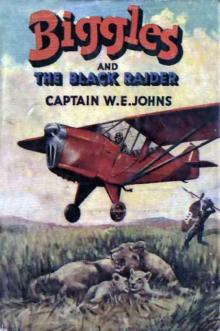 44 Biggles and the Black Raider
44 Biggles and the Black Raider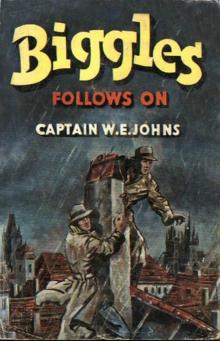 42 Biggles Follows On
42 Biggles Follows On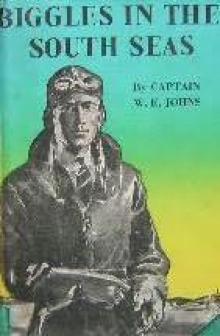 Biggles In the South Seas
Biggles In the South Seas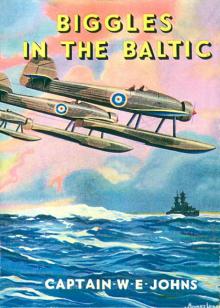 21 Biggles In The Baltic v3
21 Biggles In The Baltic v3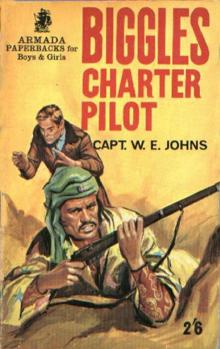 27 Biggles - Charter Pilot
27 Biggles - Charter Pilot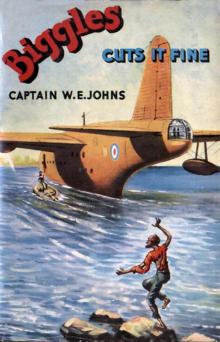 49 Biggles Cuts It Fine
49 Biggles Cuts It Fine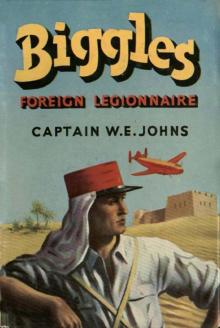 51 Biggles Foreign Legionaire
51 Biggles Foreign Legionaire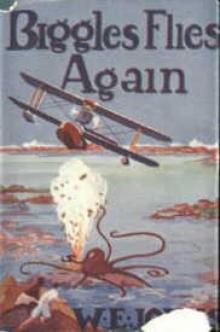 04 Biggles Flies Again
04 Biggles Flies Again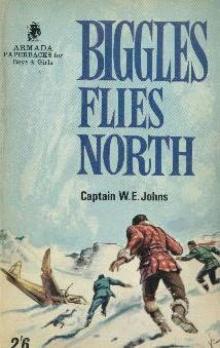 16 Biggles Flies North
16 Biggles Flies North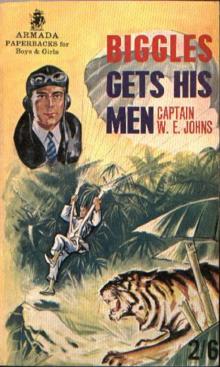 37 Biggles Gets His Men
37 Biggles Gets His Men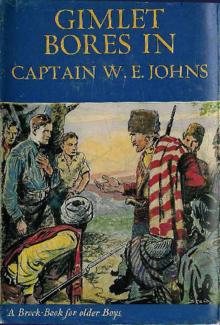 07 Gimlet Bores In
07 Gimlet Bores In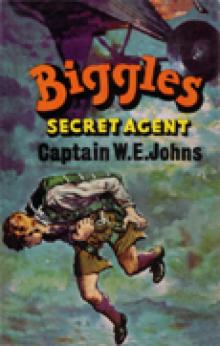 19 Biggles Secret Agent
19 Biggles Secret Agent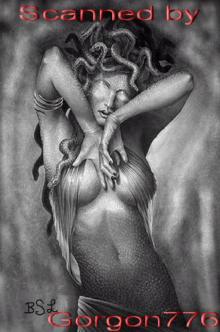 32 Biggles In The Orient
32 Biggles In The Orient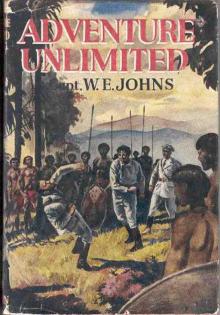 Adventure Unlimited
Adventure Unlimited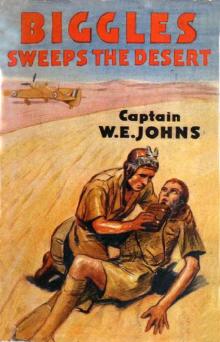 26 Biggles Sweeps The Desert
26 Biggles Sweeps The Desert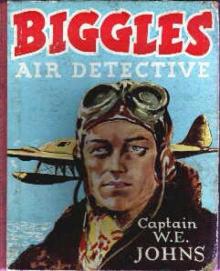 Biggles Air Detective (43)
Biggles Air Detective (43)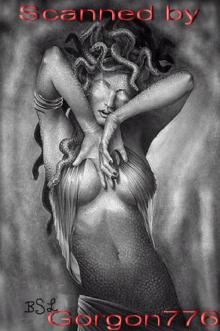 36 Biggles Breaks The Silence
36 Biggles Breaks The Silence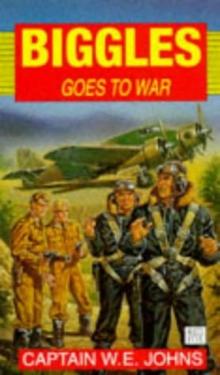 14 Biggles Goes To War
14 Biggles Goes To War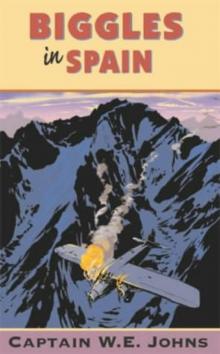 18 Biggles In Spain
18 Biggles In Spain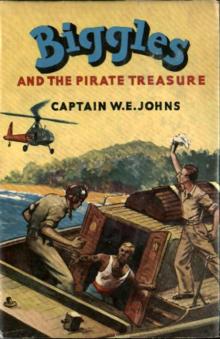 50 Biggles and the Pirate Treasure
50 Biggles and the Pirate Treasure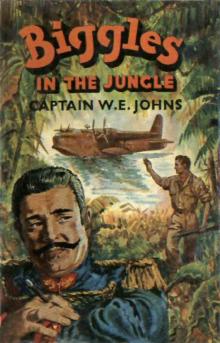 25 Biggles In The Jungle
25 Biggles In The Jungle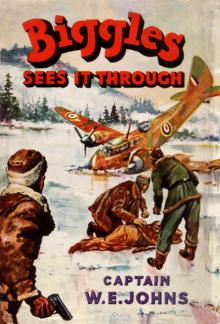 23 Biggles Sees It Through
23 Biggles Sees It Through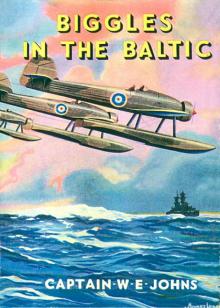 21 Biggles In The Baltic
21 Biggles In The Baltic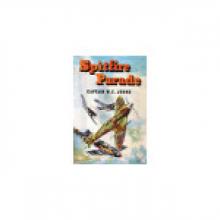 24 Spitfire Parade
24 Spitfire Parade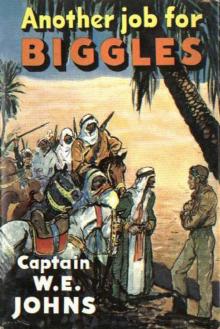 38 Another Job For Biggles
38 Another Job For Biggles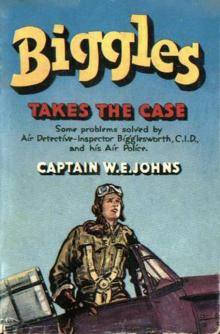 41 Biggles Takes The Case
41 Biggles Takes The Case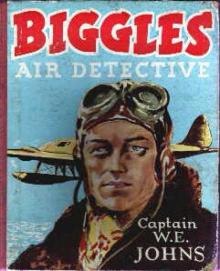 43 Biggles Air Detective
43 Biggles Air Detective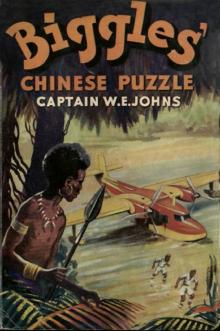 53 Biggles Chinese Puzzle
53 Biggles Chinese Puzzle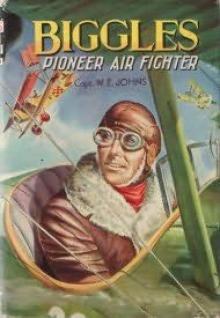 Biggles Pioneer Air Fighter (51)
Biggles Pioneer Air Fighter (51)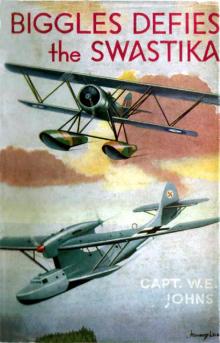 22 Biggles Defies The Swastika
22 Biggles Defies The Swastika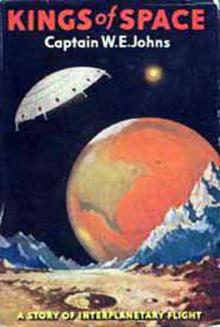 01 Kings Of Space
01 Kings Of Space